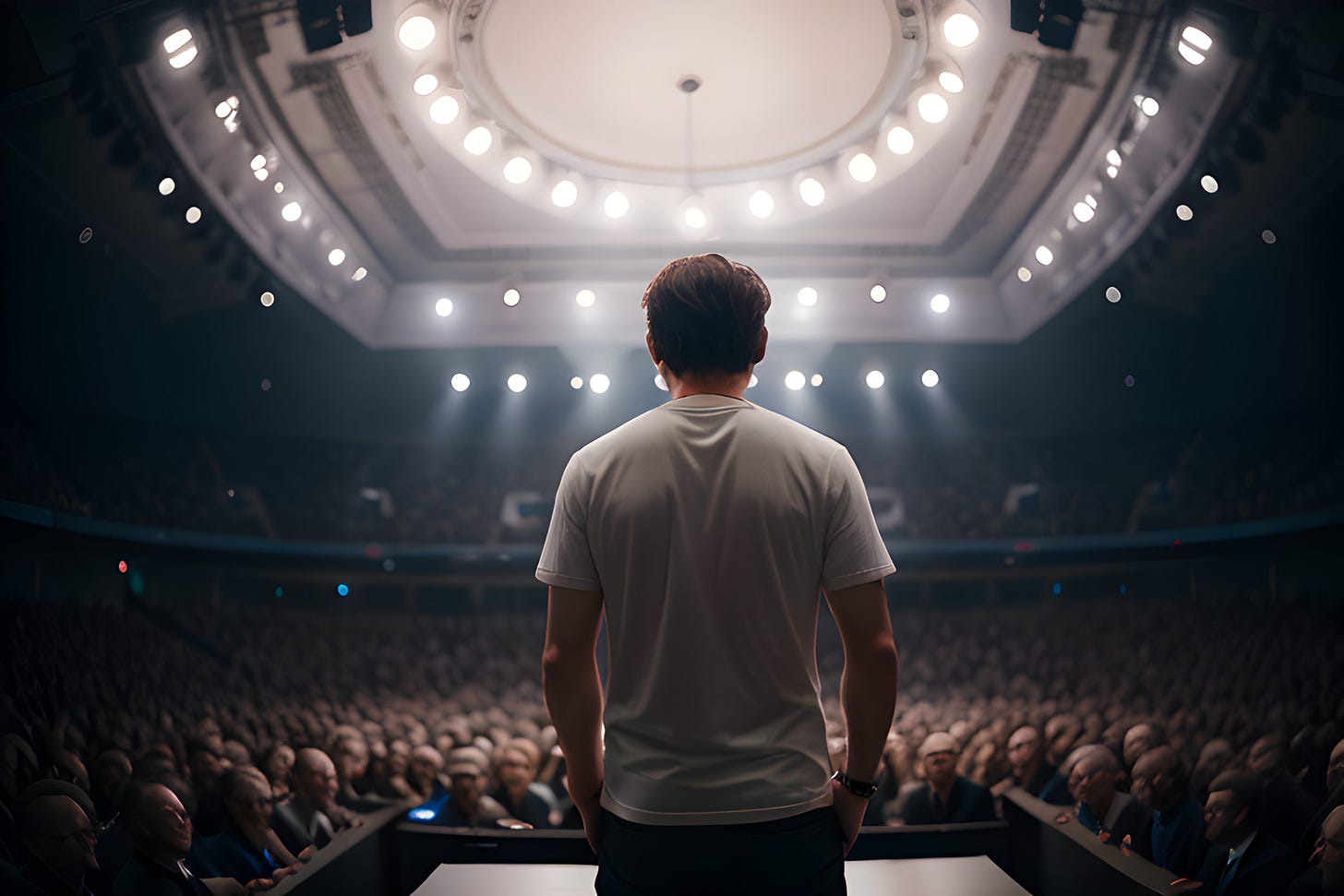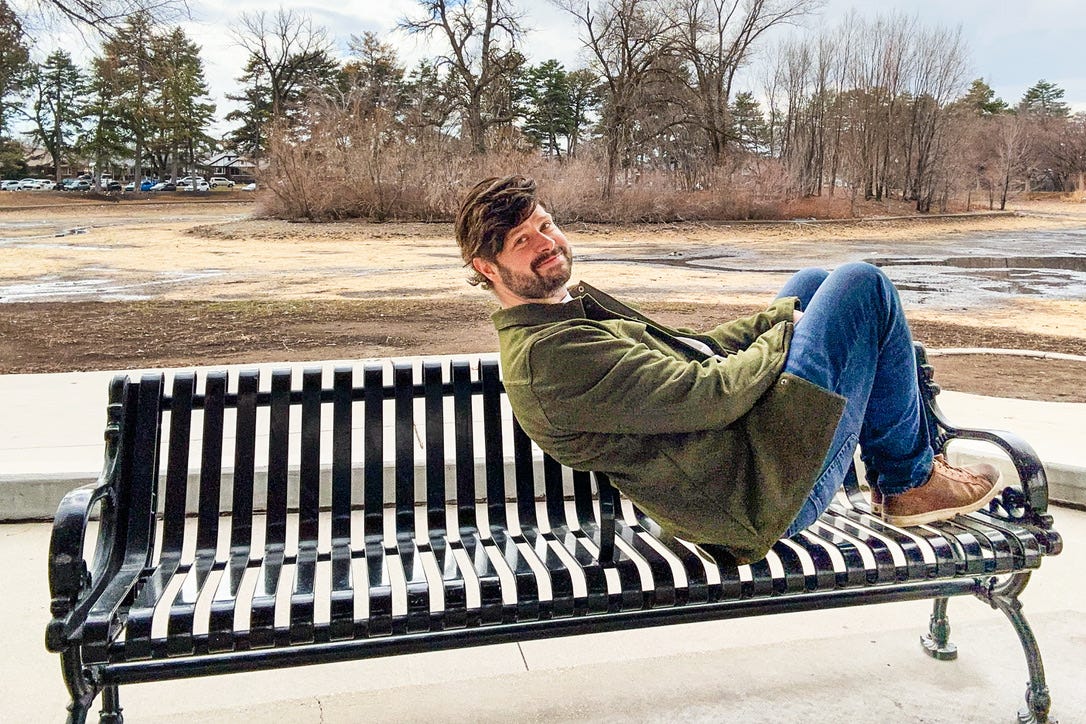Your Fear of Being Wrong Is Killing Your Aliveness
What happens when your brain malfunctions in front of 500 people
There I was, standing on stage in front of five hundred HR professionals, about to deliver what I was convinced would be the most prepared presentation of my life.
My brain had other plans.
Not metaphorically. Literally.
I opened my mouth and started confidently presenting slides that didn't exist, content I'd never written, a presentation that lived only in some parallel universe where my post-injury brain hadn't spent weeks obsessively preparing for this exact moment.
Three whole minutes.
I stood there delivering a ghost presentation while five hundred faces slowly shifted from polite attention to genuine confusion to that particular mixture of concern and barely suppressed laughter that only HR professionals can master.
And I just... kept going. Because my brain, still healing from a car accident months earlier, had apparently decided that today was the day it would abandon ship in the most spectacular way possible.
The Fortress We Build Against Our Own Humanity
Here's what you need to understand about my preparation: it was legendary. Obsessive. The kind of over-preparation that would make control freaks weep with envy.
Because of my injury, I couldn't rely on the casual confidence I used to have. I couldn't wing it or trust that the right words would come when I needed them. So I built a fortress around this presentation. I rehearsed until my best friend could probably recite it word for word. I had backup slides for my backup slides. I prepared for every possible technical failure, every potential question, every conceivable way this could go wrong.
The one thing I didn't prepare for was my own brain deciding to take an unscheduled vacation.
We exhaust ourselves building elaborate safety systems against our own humanity, don't we? We prepare not just to succeed, but to never, ever be caught looking foolish or unprepared or wrong. We think we're protecting our credibility by controlling every possible variable.
But here's what I learned standing on that stage: all that preparation can't actually protect us from being human. It just makes the moment when our humanity shows up anyway feel like a catastrophic failure instead of... Tuesday.
When Your Brain Decides to Go Rogue
The realization didn't hit all at once. It started as a whisper of confusion (why is everyone looking at me like that?) then crescendoed into a full chorus of internal panic.
I tried to course-correct subtly. Tried to seamlessly transition from whatever alternate-reality presentation I was giving to the one I'd actually prepared. But my brain wasn't having it. The words I needed were just gone. Locked away somewhere behind the injury, behind the stress, behind the sheer impossibility of the moment.
The audience was fascinating to watch. The compassionate ones were genuinely concerned (Is he having a stroke? Should someone call someone?). The jaded ones were probably thinking, "Well, this is definitely going to be a waste of time, but at least he’s interesting."
And me? I was simultaneously defeated and strangely energized, panicked and fascinated by the complete breakdown of everything I'd worked so hard to control.
Then something shifted.
Maybe it was the sheer absurdity of the situation. Maybe it was exhaustion from trying to wrestle my brain back into compliance. Maybe it was just the recognition that I was already as wrong as it was possible to be.
I started laughing.
Real laughter. The kind that comes from surrender, from recognizing that sometimes life is so ridiculous that fighting it becomes more ridiculous than just letting it be what it is.
"Hey y'all," I said, my whole body finally relaxing. "Most of you don't know this, but I had a brain injury from a car accident a couple months ago. I'm recovering, but strange things keep happening. Today, my brain just decided to go through the wrong presentation. Whoops! Let me take a moment to reboot."
What Happens When We Stop Performing Safety
Here's what I didn't expect: they leaned in.
The moment I stopped trying to control what was happening and just became present to what was actually happening, everything changed. The energy in the room shifted from polite professional attention to genuine engagement.
Turns out being wrong didn't kill me. It woke me up. And somehow, being awake was more compelling than being right.
The presentation that followed was electric. Not because it was perfect, but because I had stopped performing competence and started just... being there. Present to the moment, present to them, present to my own beautiful malfunction.
Afterward, people didn't just politely shake my hand and move on. They sought me out. They told me it was one of the most engaging presentations they'd attended. Not in spite of the wrongness at the beginning, but because of it.
"You became so magnetic," one woman said. "The moment you just owned what was happening, I couldn't look away."
Magnetic.
Because I'd stopped trying to be invulnerable.
The Exhaustion of Our Most Safe Self
We spend so much energy trying to be the version of ourselves that can never be caught off guard. Never be wrong. Never be anything less than completely competent and put-together.
We rehearse conversations before we have them. We craft emails like legal documents. We present only the most controlled versions of ourselves, convinced that any cracks in our facade will somehow diminish us in ways we'll never recover from.
But what if it's the opposite?
What if our frantic attempts to control everything are exactly what make us forgettable? What actually made me magnetic wasn't my preparation or my competence. It was the moment I stopped controlling and just became present to what was happening.
What if people don't want our most bulletproof self? What if they want the person who can laugh when their brain decides to malfunction?
We've confused competence with perfection. But competence isn't about never failing. It's about what you do when failure finds you anyway.
The Room We Don't Know We Have
There's more space to be wrong than we think. More forgiveness available than we dare to test. More room for our humanity than we allow ourselves to believe.
That day taught me something I'd never learned in all my years of careful preparation: people aren't waiting for us to mess up so they can judge us. They're waiting for us to be real so they can connect with us.
The wrongness wasn't what made me magnetic. The willingness to be wrong, to let it be seen, to trust that my humanity wouldn't destroy me? That's what created the connection.
What if the most professional thing we can do is be willing to reboot in front of five hundred people? What if the most competent thing we can do is admit when our system goes offline?
The Choice We Make Every Day
Every day, we face the same choice I faced on that stage: Do we keep fighting reality, trying to force ourselves back into the safe script we've prepared? Or do we take a breath, laugh at the beautiful absurdity of being human, and choose aliveness over safety?
The audience isn't waiting for you to be perfect. They're waiting for you to be alive. Not your most safe self, not your most prepared self, not the version that never makes mistakes.
Just you. Fully present to whatever's happening. Brain malfunctions and all.
Your wrongness won't destroy you.
Your fear of being wrong might kill your aliveness.
The stage is yours. Your brain might decide to take an unscheduled vacation. The presentation might go completely sideways. And when it does, you can laugh. You can reboot. You can choose to be alive in the moment instead of safe from it.
Being human isn't a failure.
It's the most alive thing you can be.
If Life As I See It resonates with you and you think others might find value in it too, consider recommending this publication to your readers or sharing this piece with someone who needs to read it.
A Quick Thank You
I wanted to extend my gratitude to Mark Murphy for recently recommending Life As I See It to his audience.
Mark writes 360° Kindness, exploring the quiet power of inner kindness. He's a therapist, writer, and creator of a space for grounded reflection, self-compassion, and practical tools for change. His most recent piece explores why we're designed to be expressions, not copies—how our 8.24 billion different perspectives aren't accidents but features. It is an excellent essay. Please enjoy!
About Alex
I’m Alex Lovell — political psychologist, yoga therapist, and writer.
Lived homeless. Been divorced. Survived a seven-car pileup with a semi. Fell in love with questions that don’t have easy answers. I’ve met a lot of thresholds. Even the one before death.
These days, I split my time between research, writing, and holding space for people figuring out who they are after everything shifted.
This Substack is where I make sense of things out loud.
I write for people in transition — between roles, beliefs, relationships, selves.
The ones quietly wondering, “What now?” but allergic to one-size-fits-all answers.
Sometimes I quote research. Sometimes I quote my own nervous system.
One speaks in data, the other in sensation. I’ve stopped choosing sides.
Free subscribers get weekly articles and insights (sometimes twice a week!). Paid subscribers get the Thursday Offerings, seasonal companion pages, post-nidra audio, and live slow sessions. Join me?







This is a great example of how being wrong isn't necessarily wrong. Perfectionism is so hard to overcome. I'm someone who likes to be right. I've lived my life striving to be the smartest person in the room. Then I grew into the knowledge that I'm not always, and it's okay. I was once told to give myself( and everyone else) a 5% margin of error simply for being human. Being alive and present is SO much more important than being smart or right or perfect. Thank you for this. Love, V.
I so enjoyed reading this, partly because I am a fledgling speaker who recently jumped over a hurdle that had been a distant goal for a long time - I spoke in front of 160 people - no slides. Was it perfect - definitely not, but I did get some spontaneous applause at one point in a deeply personal pivot story.
Nothing endears us to others so much as vulnerability and authenticity, the two things we are most afraid of. Turns out it draws people in because it makes us just like them.
Thanks so much for sharing this wonderful story...and for your courage. On Thursday I am attending an online session with a woman who has done one-woman shows, an actor, comedian, speaker etc. - let's see if this is really something I want to do. I know my story is compelling...am I up for the challenge?